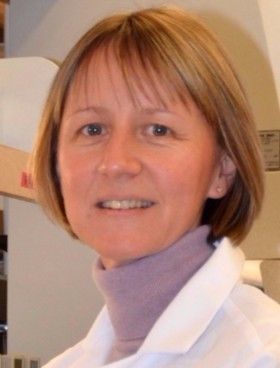USH|R Guest Research Blog, Part I
December 14, 2015
by Gwenaëlle S. Géléoc Ph.D.


Name: Gwenaëlle S. Géléoc Ph.D.
Title: Assistant Professor
Institution: Boston Children’s Hospital, Boston, USA
Website: https://sites.google.com/site/holtgeleoclab/
Research Interests: Functional Development of hair cells; Ion channels; Mechanotransduction; Usher Syndrome; Gene Therapy.
About me:
My passion for inner ear research began as an undergraduate student at the University of Montpellier (France) when I first saw an inner ear sensory cell under the microscope! During my graduate and post-graduate studies, I was fortunate to train with some wonderful scientists who gave me solid foundations and encouragement to pursue my career as an independent scientist. I moved to the United States in Fall of 1999 to join the Howards Hughes laboratory of Dr. David Corey at Massachusetts General Hospital where I met Jeffrey Holt as a postdoctoral fellow in Boston. Our passion for inner ear research brought us together and we moved to the University of Virginia in 2001. We started our lab there in the Department of Neuroscience. Over the following 10 years, I focused my efforts on studying the development of inner ear hair cells. Hair cells of the inner ear have the critical role of converting sound and head movement information into electrical signals which are transmitted to the brain. Understanding how these cells develop and mature in the normal ear was, for me, a critical step toward deciphering the role of numerous deafness genes. I moved my lab to Boston Children’s Hospital in the summer of 2011 with the goal of bridging my knowledge with the clinic and focusing my research on elucidating how hair cell genes responsible for congenital auditory and vestibular disorders in humans disrupted hair cell development and survival. A large number of genes that affect inner ear hair cell development also affect photoreceptor cells in the eye and lead to Usher syndrome. Over the past three years, a major portion of my work has been focused on understanding the role of these genes and the development of novel strategies aimed at restoring function in mouse models of Usher syndrome. In particular, I am developing new viral vectors that can be injected in the ear of newborn mice to reintroduce normal copies of the genes needed for hearing. The goal is to restore hearing in a mouse model of Usher syndrome that would otherwise be deaf. My hope is that successes in the lab will one day be translated into treatments for Usher patients.
Usher Syndrome Registry and Genetic testing: How it can help us.
Access to databases for patients who have been diagnosed with Usher syndrome will become more valuable as research progresses towards pre-clinical and clinical studies. Knowing the phenotype of the patients, knowing which gene is affected, which mutation or variant is suspected to be responsible for the deafness and blindness, and how frequent each mutation occurs, will help accelerate our research. We may have a mouse model with a similar mutation or we might generate a new mouse model that mimics a particular mutation. These models are valuable to help understand the pathophysiology and progression of the syndrome. Soon, we may be able to generate patient-derived pluripotent stem cells and study the cellular consequences of Usher mutations in the lab. Once we know which gene or which mutation causes a particular symptom, we can design and test therapies to counteract the cellular disorders that result from this mutation. When time comes to initiate clinical trials, the Usher Syndrome Registry will be essential for clinicians and scientists to identify the patients that may qualify for a study.
More information:
Review: Sound Strategies for Hearing Restoration. Géléoc GSG and Holt JR. Science 344 no. 6184, 2014.
Website: https://sites.google.com/site/holtgeleoclab/
Support USH Research | Support the USH Registry
Join the International Usher Syndrome Registry







